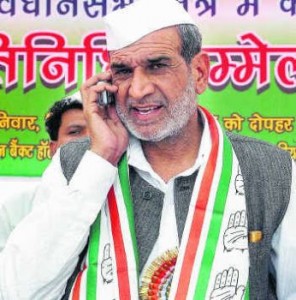Sikh Genocide 1984
CBI concluded arguments against Sajjan Kumar & five others in November 1984 Sikh carnage case
March 23, 2013 | By Sikh Siyasat Bureau
New Delhi, India (March 23, 2013): As per media reports the CBI today concluded it’s arguments in the trial of an Indian politician leader Sajjan Kumar and five others in a November 1984 genocidal violence related case. The agency opposed the defence arguments and said the nature and extent of crime shows the vast network and larger conspiracy behind it.
“The nature and extent of crime, protection to the perpetrators, disappearance of evidence and non-registration of cases show that there was a vast network and a larger conspiracy behind it,” CBI Special Prosecutor R S Cheema said while wrapping up arguments in the case.
During his submissions made before District Judge J R Aryan, Cheema, assisted by advocate D P Singh, reportedly said that Sajjan Kumar was involved in the killings.
The prosecution also reportedly rebutted Sajjan Kumar’s arguments that the statement of CBI witnesses were contradictory and relied on the deposition of witness Manjeet Singh who it said supported the agency’s case and also narrated how the raging mob roamed in the area searching for Sikhs and killed those they found.
Advocate Cheema reportedly pointed out that none of the accused including Sajjan Kumar had challenged Manjeet Singh’s deposition and therefore, it was a strong piece of evidence.
The CBI argued that on November 1, 1984 Sajjan Kumar had ordered the killings of Sikhs and the manner in which the police did not register even a case about the incident shows that there was a conspiracy of terrifying proportion between Kumar and the police during the violence against the Sikhs.
Advocate Cheema concluded his arguments with an Urdu couplet apparently directed at the conduct of the police, “Na daman pe koi cheet, na khanjar pe koi daag, wo qatal karey hain ya karamat karey hain” (there is no blood stain to be seen, was it a murder or some some magic).
The counsel was hinting at the CBI’s stand that the Delhi police had turned a blind eye to the killings.
It is notable that Sikhs were subjected to genocidal violence in the first week of November 1984 after the assassination of contemporary Indian prime minister Indira Gandhi on 31 October, 1984. The culprits, who perpetuated the genocide have enjoyed impunity over last 28 years. There were few instances where the culprits were charged and convictions were there in very rare cases, that too in the cases of low-profile culprits.
An independent inquiry by human rights bodies namely “People’s Union for Civil Liberties” and “People’s Union for Democratic Rights” had concluded that:
“A fact-finding team jointly organised by one People’s Union for Democratic Rights (PUDR) and people’s Union for Civil Liberties (PUCL) in the course of investigations from November 1 to November 10, has come to the conclusion that the attacks on members of the Sikh Community in Delhi and its suburbs during the period, far from being a spontaneous expression of “madness” and of popular “grief and anger” at Mrs. Gandhi’s assasination as made out to be by the authorities, were the outcome of a well organised plan marked by acts of both deliberate commissions and omissions by important politicians of the Congress (I) at the top and by authorities in the administration. Although there was the handiwork of a determined group which was inspired by different sentiments altogether”.
– Who Are Guilty? (1984), PUCL and PUDR
[source: http://www.pucl.org/ Topics/ Religion-communalism/ 2003/ who-are-guilty.htm]
Many culprits including Sajjan Kumar, Jagdish Tytler, HKL Bhagat and Kamal Nath were rewarded with high profile political positions by the Indian state.
The case against Sajjan Kumar was registered after a delay of two decades and the verdicts is yet to be pronounced in this case, whereas 28 years have already passed since the genocide took place. Many like Jagdish Tytler and Kamal Nath never faced trial for their participation in the genocide of Sikhs in 1984.
To Get Sikh Siyasat News Alerts via WhatsApp:
(1) Save Our WhatsApp Number 0091-855-606-7689 to your phone contacts; and
(2) Send us Your Name via WhatsApp. Click Here to Send WhatsApp Message Now.
Sikh Siyasat is on Telegram Now. Subscribe to our Telegram Channel
Related Topics: 1984 Sikh Genocide, CBI, Indian State, November 1984, Sajjan Kumar





